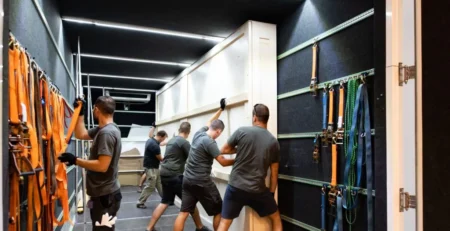ICEFAT Covid Aftermath: Part 2
- Company News

In the second of our three-part report on ICEFAT’s response to coronavirus, we discuss how usage of fine art facilities managed by our membership has changed. We also discuss the day-to-day operations of our agents and the changes necessitated by the pandemic, and what these changes mean for both staff and clients.
Viewing and Vaulting
The Covid-19 pandemic has led to an accelerated demand for fine art storage services for the majority of ICEFAT members. In the immediate term, lockdowns meant that works could not be shipped to where they had been ordered, meaning they have been stuck in limbo. Many shippers offered complimentary extensions of storage periods in order to help dealers who had no other choice. Klaus Hillmann of Tandem has seen requests for storage increase across the sector for years, however. “This increase is mainly due to a process of professionalization of large private and corporate collections,” says Hillmann. The pandemic seems to have therefore quickened an existing trend of increasing demand for storage.
The physicality of a remote sale in these times is not often considered by online buyers. When visiting an online viewing room, a viewer’s thoughts focus on the work being seen as it appears on the screen, and how it may look in a domestic or gallery space. Although the viewer is not physically looking at it, that work still exists, and is often kept safely and securely in store by an ICEFAT fine art shipper. “We have seen a keen interest amongst dealers to maintain sales, some done virtually,” says Kerry Thompson of PACART, indicating that ICEFAT shippers have played a role in quite literally facilitating the boom of online sales with their fine art facilities the world over.
Fine art facilities have also been useful for dealers as spaces in which clients can come to view works in specialised viewing rooms located at these facilities, and due to their size, there are no issues with maintaining social distancing. Alexander Bradford of Gander & White says: “Our viewing rooms have proven especially popular as a location where clients can view stock. In New York our two viewing rooms have been so popular among gallery and auction house clients that we are planning to open a third in the very near future.”
Jonathan Schwartz of Atelier 4 notes that “vaulting” has become a tactic for dealers and auction houses who are keeping their tangible assets in store to weather out the Covid-19-caused recession. It’s the same case globally. In India, Al Mithal of Star Worldwide has seen that “collectors and galleries are asking for storage, hoping for markets to recover, and for shipping services and freight rates to stabilise.” In Japan, responses have been mixed, Katolec has seen clients ‘warehousing’ their goods, waiting for air freight rates to decrease. Shige Moriyama of Yamato, however, says that the threat of a market downturn is not stopping dealers, saying that “we have clients in Japan who so far are still very aggressive to approach their clients to get the deal, rather than keep [storing stock] and waiting until the market recovers.” Fine art shippers have therefore seen market confidence from some clients, and cautiousness from others, in the faith that the market should return to pre-coronavirus levels relatively soon.

Navigating the New Normal
Client and staff safety have been at the heart of ICEFAT shippers’ response to the virus. With the easing of national and local lockdown restrictions in many parts of the world, agents are looking at how to operate in this ‘new normal’. All shippers have put in place protocols to limit the amount of physical contact that takes place; Al Mithal’s list of protocols sums up the main practices enacted by many ICEFAT agents: “mandatory requirements such as use of face masks, PPE suits, hand sanitizers and infra-red thermometers are now part of normal standard operating procedures.” Ship/Art in South San Francisco, on the US West Coast, has put in place an 18-page policy that governs how they operate, and “will adjust based on the current risk.” These new protocols often lead to new time and logistical challenges, but as Kerry Thompson of PACART puts it “some of these changes were easier than others, but we feel that nothing can come before safety.” Anil Mithal of Mithals International expects some of the changes to their practice may become a “permanent feature.” He says: “they enhance our ability in the marketplace and boost the customers’ confidence.”
Everywhere, shippers have embraced remote work to continue their business. Klaus Hillmann says Tandem in Germany have put in place a protocol to enable them to remain operational while limiting the potential spread of coronavirus: “Initially, we split our office staff into two cohorts, working in our premises and at home, alternating weekly. The warehouse staff has been halved in line with the low level of orders, and also works in two separate groups. We have the drivers working in fixed teams too, which has been largely successful.” In Japan both Katolec and Yamato implemented remote working as soon as the virus arrived in the country. Shige Moriyama at Yamato foresees the possibility of this remote work becoming permanent to some extent. He points to how the workforce could be expanded under these measures, “including employees required to balance work around childcare responsibilities and thus would benefit from working from home.”










